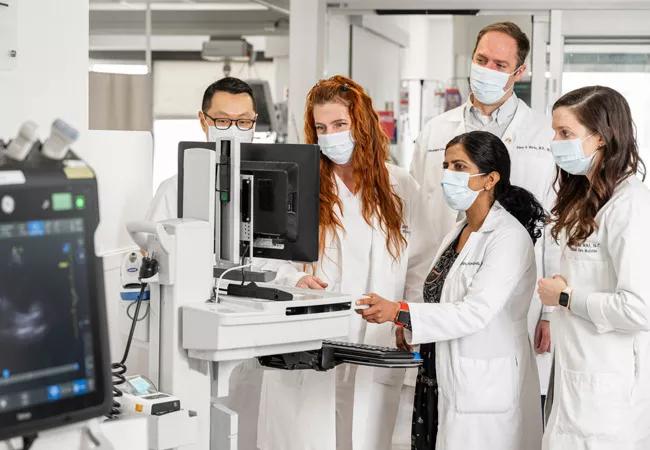An interdisciplinary team of specialists improves outcomes with effective collaboration, communication and identifying and implementing best practices

Onc ICU leadership (from left to right): Humberto Choi, MD, (Associate Onc ICU Director), Tiffany Lang (G62 MICU RN Manager), Simon Mucha, MD, (Onc ICU Medical Director), Deepa Jagadeesh, MD, (Hematology Champion), Elisha Fleig PA (APRN/PA Manager)
Advertisement
Cleveland Clinic is a non-profit academic medical center. Advertising on our site helps support our mission. We do not endorse non-Cleveland Clinic products or services. Policy
Written by Simon Mucha, MD, Humberto Choi, MD, Elisha Fleig, Heather Torbic, Tiffany Lang
Approximately five percent of patients with cancer will require intensive care unit (ICU) care for management of acute life-threatening conditions often due to complications from the underlying cancer or toxicity from cancer-directed therapies. In Cleveland Clinic’s Medical ICU, 20% of patients have a diagnosis of cancer that is being actively managed. We expect these numbers to increase further as progress in cancer treatment leads to increased survival.
Resource utilization, morbidity and mortality of critically ill patients with cancer remain high.1,2,3 The complexity of their underlying illness, rapidly evolving oncologic therapies and distinct treatment-related toxicities make ICU management needs of critically ill patients with cancer uniquely challenging. Therefore, Cleveland Clinic’s main campus Medical ICU developed a dedicated Medical Oncology ICU team to best meet these complex care needs. This team has been operational since February 2023.
The Medical Oncology ICU is an interdisciplinary team led by core medical intensivists with expertise in the care of critically ill patients with oncologic and hematologic disorders, dedicated critical care pharmacists, experienced advanced-practice providers (nurse practitioners and physician assistants) and a nursing team cross-trained in oncology and critical care. The Medical Oncology ICU team works in close collaboration with the Cleveland Clinic Lymphoma, Myeloma, Leukemia, Bone Marrow Transplant and Solid Tumor Oncology inpatient services as well as Infectious Disease, Nephrology, Palliative Care Medicine and other specialty consulting services as needed.
Advertisement
Recent studies demonstrated reduced ICU length of stay among centers with greater experience providing cancer-specific treatment within the ICU, standardized practices and interprofessional care delivery models.4,5,6 Whereas, delayed ICU admission due to uncertainty of therapeutic benefit in the setting of limited ICU experience and poor communication between intensivist and oncologist have been shown to be associated with poor outcomes including increased duration of ICU and hospital lengths of stay.7,8 Additionally, increased medication regimen complexity is associated with an increased risk of medication errors and mortality.9 Pharmacy interventions have been associated with a reduction in adverse events, medication errors, and resource utilization.10
This dedicated ICU team aims to address these issues by facilitating effective collaboration and communication between ICU and oncology teams, standardizing interdisciplinary ICU workflow, and implementing protocols and best practices. The Medical Oncology ICU conducts a daily team huddle which allows for care coordination of our ICU patients, and identification of patients admitted in regular floor oncology services who are at risk for decompensation and may need early ICU evaluation.
References
Advertisement
Advertisement

AHA scientific statement outlines models for high-intensity staffing, specialized expertise and more

Medication-focused intervention key to management success in a challenging population

How Cleveland Clinic transformed a single ultrasound machine into a cutting-edge, hospital-wide POCUS program

Nurse-led research provides surprising insights

Key themes and insights into the family-caregiver experience

Pediatric specialists unpack new evidence, considerations for care and what’s ahead

Cleveland Clinic research emphasizes taking a holistic and individualized approach to care of septic shock

Nurses find unique challenges, profound rewards when managing children with cancer